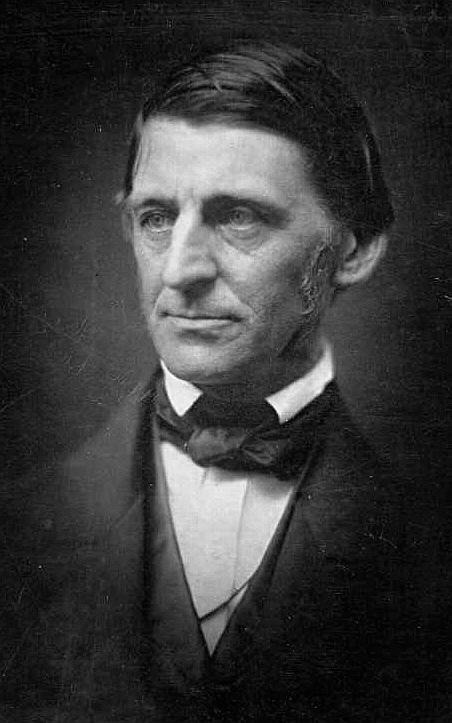 |
| Image Credit: Wikipedia.com |
Ralph Waldo Emerson (May 25, 1803 – April 27, 1882) was an American essayist, lecturer, and poet who led the Transcendentalist movement of the mid-19th century. In 1823, he wrote the poem Good-Bye. In 1832, he became a Transcendentalist, leading to the later essays Self-Reliance and The American Scholar. Emerson was seen as a champion of individualism and a prescient critic of the countervailing pressures of society. His religious views were often considered radical at the time. He believed that all things are connected to God and, therefore, all things are divine.
Emerson married Ellen Tucker in 1829. When she died of tuberculosis in 1831, he was grief-stricken. Her death, added to his own recent crisis of faith, caused him to resign from the clergy. In 1832 Emerson traveled to Europe, where he met with literary figures Thomas Carlyle, Samuel Taylor Coleridge and William Wordsworth. When he returned home in 1833, he began to lecture on topics of spiritual experience and ethical living. He moved to Concord, Massachusetts, in 1834 and married Lydia Jackson in 1835. By the 1870s the aging Emerson was known as “the sage of Concord.” Despite his failing health, he continued to write, publishing Society and Solitude in 1870 and a poetry collection titled Parnassus in 1874.
Today we celebrate Earth Day in the midst of National Poetry Month. We invite you to commemorate this special day and enjoy the poem, Earth-Song, by Ralph Waldo Emerson.
Earth-Song
By Ralph Waldo Emerson
'Mine and yours;
Mine, not yours.
Earth endures;
Stars abide--
Shine down in the old sea;
Old are the shores;
But where are old men?
I who have seen much,
Such have I never seen.
'The lawyer's deed
Ran sure,
In tail,
To them, and to their heirs
Who shall succeed,
Without fail,
Forevermore.
'Here is the land,
Shaggy with wood,
With its old valley,
Mound and flood.
But the heritors?—
Fled like the flood's foam.
The lawyer, and the laws,
And the kingdom,
Clean swept herefrom.
'They called me theirs,
Who so controlled me;
Yet every one
Wished to stay, and is gone,
How am I theirs,
If they cannot hold me,
But I hold them?'
When I heard the Earth-song
I was no longer brave;
My avarice cooled
Like lust in the chill of the grave.
Comments
Post a Comment